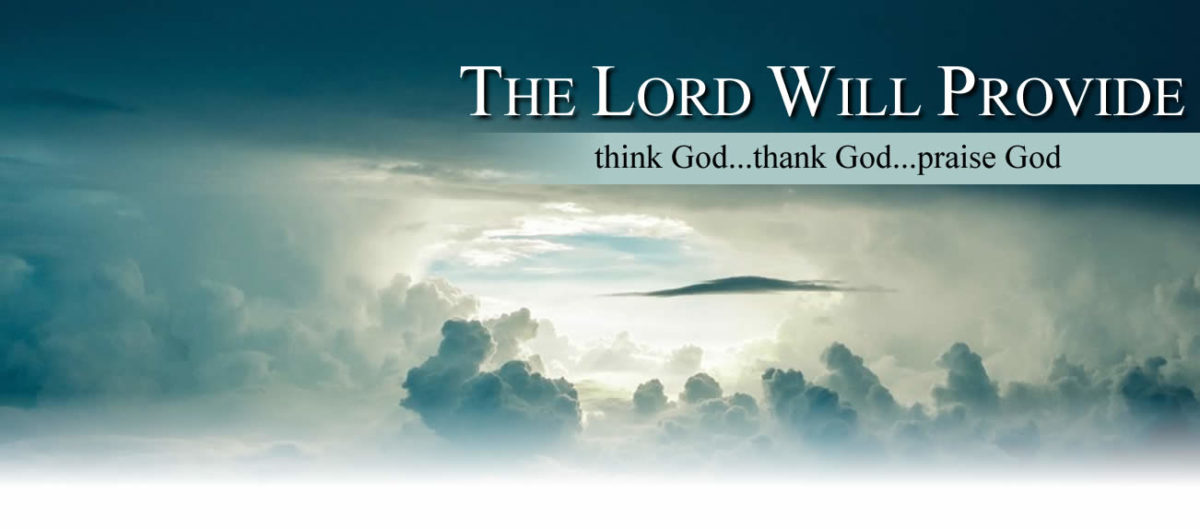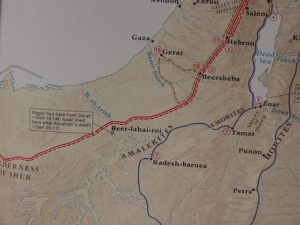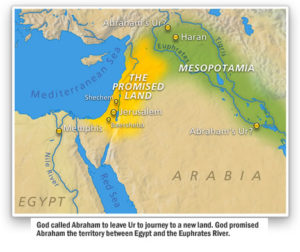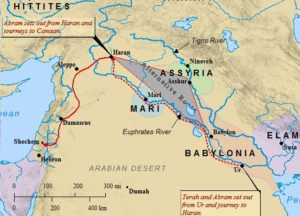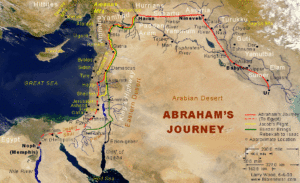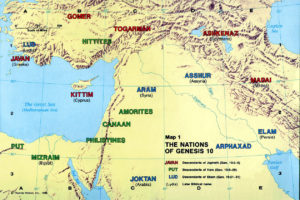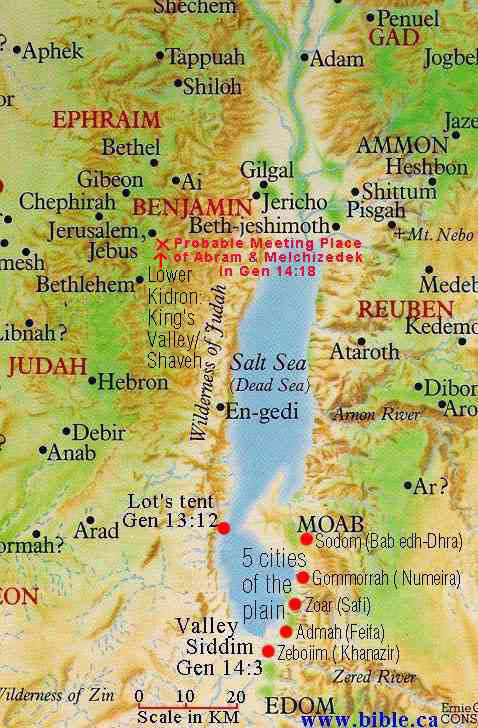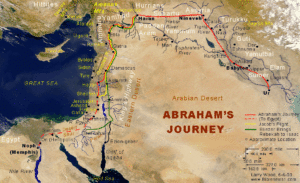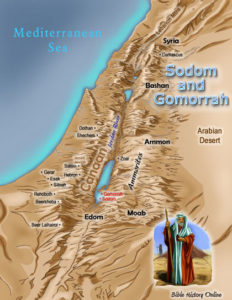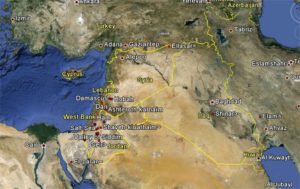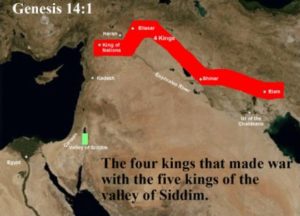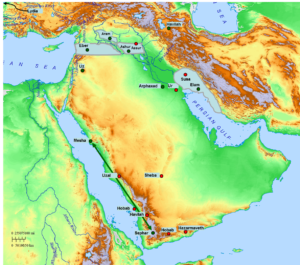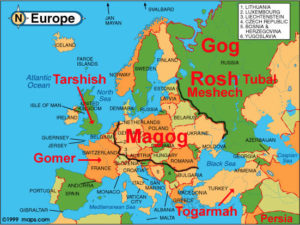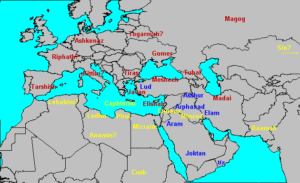27
1 Now it came to pass, When Isaac was old and his eyes were so dim that he could not see, That he called Esau his older son and said to him, “My son.” And he answered him, “Here I am.” 48:10
2 Then he said, “Behold now, I am old. I do not know the day of my death. 35:28; James 4:14
If we go forward to chapter 35 we read that Isaac lived to be 180 years of age. But also in that same chapter we read that his son Jacob had already come back from Padan-aram, and has had all twelve of his sons when Isaac died. We know also that Jacob lived in Padan-aram for twenty years according to Gen 31:28. So then we can surmise that Isaac had to be well over 100 years of age when he lost sight, and wanted to Give Esau a blessing.
3 “Now therefore, please take your weapons, your quiver, your bow, and go out to the field and hunt game for me.
4 “And make me savory food, such as I love, and bring it to me that I may eat, That my soul may bless you before I die.” 25:27, 28
Now the blessing that Isaac wants to give Esau is not the covenant blessing the Lord gave to Abraham and handed down to him, (As far as the seed in which all nations shall be blessed thru the Lord Jesus Christ). As we will read in verses 27-29, where Jacob deceives his father into getting Esau’s blessing, and also in verses 39, and 40, where Esau gets a smaller blessing than Jacob, there is never a mention of the Abrahamic covenant. If we look at the BDB definition of the word bless, (As defined in the BDB definition), it is a description of the ritual of the actual blessing. So I have included both definitions of Bless, and also of Blessing, in these verses we will see that the blessings Isaac gives to his sons are in agreement with the BDB definition:
Blessing: (H1293): בּרכה : berâkâh
BDB Definition:
1) blessing
2) (source of) blessing
3) blessing, prosperity
4) blessing, praise of God
5) a gift, present
6) treaty of peace
Bless: (H1288): בּרך: bârak
BDB Definition:
1) to bless, kneel
1a) (Qal)
1a1) to kneel
1a2) to bless
1b) (Niphal) to be blessed, bless oneself
1c) (Piel) to bless
1d) (Pual) to be blessed, be adored
1e) (Hiphil) to cause to kneel
1f) (Hithpael) to bless oneself
2) (TWOT) to praise, salute, curse
In the passing down of the Abrahamic covenant, to which all nations will be blessed (Thru our Lord Jesus Christ) it is the birthright (Not the blessing), in which this covenant is handed down. I would like to quote from Adams Clarke’s commentary on Genesis 25:31 to help explain what I mean here:
Sell me this day thy birthright – What the בחרה bechorah or birthright was, has greatly divided both ancient and modern commentators. It is generally supposed that the following rights were attached to the primogeniture:
1. Authority and superiority over the rest of the family.
2. A double portion of the paternal inheritance.
3. The peculiar benediction of the father.
4. The priesthood, previous to its establishment in the family of Aaron.
Calmet controverts most of these rights, and with apparent reason, and seems to think that the double portion of the paternal inheritance was the only incontestable right which the first-born possessed; the others were such as were rather conceded to the first-born, than fixed by any law in the family. However this may be, it appears,
1. That the first-born were peculiarly consecrated to God, Exo 22:29.
2. Were next in honor to their parents, Gen 49:3.
3. Had a double portion of their father’s goods, Deu 21:17.
4. Succeeded him in the government of the family or kingdom, 2 Ch 21:3.
5. Had the sole right of conducting the service of God, both at the tabernacle and temple; and hence the tribe of Levi, which was taken in lieu of the first-born, had the sole right of administration in the service of God, Num 8:14-18; and hence we may presume, had originally a right to the priesthood previous to the giving of the law; but however this might have been, afterwards the priesthood is never reckoned among the privileges of the first-born.
That the birthright was a matter of very great importance, there can be no room to doubt; and that it was a transferable property, the transaction here sufficiently proves.
By this commentary we can see that part of the birthright includes a line of priesthood before the establishment of the Levites, and whichever way of thinking as to what the birthright represents, they both still point to a priesthood being handed down. In the New Testament we read that the Lord Jesus Christ is the priest of the new covenant, and will be forever more, doing away with the priesthood of the old testament, which is the basis of the Abrahamic covenant. There are many passages in the New testament that talk about this priesthood and our Lord Jesus Christ. I would like to quote a few passages from the New Testament which talks about the priesthood and the correlation of Jesus Christ (Compare Heb 2:16-17, 4:14-15, 5:1-10), one little nugget I would like to share here in regards to verse four is that in Gen 25:28 we read here that Isaac loved
Esau because of the game he hunted, and that Rebekah loved Jacob. Esau is his Fathers son in a sense, and Jacob is most definitely his mothers son. I will talk more about this in the coming verses.
5 Now Rebekah was listening when Isaac spoke to Esau his son. And Esau went to the field to hunt game and to bring it.
6 So Rebekah spoke to her son Jacob, saying, “Indeed I heard your father speak to Esau your brother, saying,
7 ‘Bring me game and make savory food for me, that I may eat it and bless you in the presence of the Lord before my death.’
In my opinion, Rebekah is the one who conjures up this deception against her husband Isaac. She is the main instigator here and she is the one who comes up with the idea of stealing the blessing away from her son Esau. I want to point out here that Rebekah is the sister of Laban, these are the grandchildren of Nahor, Abraham’s brother. We have already caught a glimpse into the character of Laban when Abraham’s servant went to the land of Haran to find a wife for his son Isaac (Rebekah). In chapter 29 we will see the true character come out in Laban, he is also a deceiver and manipulator, just as his Sister Rebekah is, and this is also the character of Jacob in his earlier years. As the say the apple doesn’t fall too far from the tree. In verse seven Rebekah tells Jacob that she heard Isaac say he was going to bless Esau; “In the presence of the Lord” Isaac never said he would bless Esau in the presence of the Lord. Isaac merely said that he would bless Esau before he died. So it appears to me that Rebekah is not only practicing deceit among Isaac, but also of Jacob in order to make it appear that this is not just any blessing but a special blessing that includes the presence of God and, if you will His approval. Jacob, being the person that he is at this point in time in his life would be more apt to listen to his mom if he felt that this was indeed a special blessing, unlike most.
8 “Now therefore, my son, obey my voice according to what I command you. vv. 13:43
Verse eight to me is very revealing as to the relationship between Rebekah and Jacob. Rebekah tells Jacob: “Obey my voice as I command you” now I don’t say this out of disrespect for Jacob, but he is truly his mothers son; after all we read back in chapter 25:27-28 that Isaac loved Esau, and Rebekah loved Jacob. In the same verses we also see that Jacob dwelt in the tents. These verses tell me that Jacob spent most of his time with his mother growing up, and they developed a special bond with each other; not to mention the fact that the Lord spoke to Rebekah and told her that Jacob being the youngest, would be stronger than Esau the oldest, and that the older son would serve the younger son (Gen 25:22-23), nowhere in these verses does God mention to Rebekah of the covenant between Abraham and The Lord, (In regards to the passing down of the Spiritual promised seed, in which all nations would be blessed), Although not scriptural, I would tend to think that as Jacob was growing up Rebekah told him about her encounter with the Lord, and what He promised her as to his fate.
So Rebekah had this hold on Jacob, and when she says to him, “Obey my voice and do as I command” He feels obligated to listen to her. Now like I said earlier: I don’t mean no disrespect towards Jacob by saying that he is his mothers son, there is nothing wrong with having that type of bonding with your mother be it son or Daughter. We are told in the scriptures to honor our parents (It is the 5th commandment). However Jacob does not get a free pass here either, we should honor our parents, but when they tell us to do something immoral, in this case dishonoring the father by deceiving him, then we should Obey God rather than men, or in this case women.
9 “Go now to the flock and bring me from there two choice kids of the goats, And I will make savory food from them for your father, such as he loves.
10 “Then you shall take it to your father, that he mat eat it, and that he may bless you before his death.”
This is where Rebekah falters; she could have gone to inquire of the Lord about His promise to her; regarding the fate of her two sons. She has gone to the Lord before while the children wrestled in her womb and the Lord comforted her then. Instead she decides to take matters into her own hands this time and not trust in Him. I believe that if Rebekah had gone to inquire of the Lord He would have answered her, and she would not have had to stoop to deception to bring about what the Lord had already promised her. If anything I think the lesson we should learn from this story is that if we just call on the Lord, and come to Him with a humbling attitude, and trust in Him, He is just, and righteous to pull us thru whatever ordeal we may be going thru. As I have come to realize in my studies of the Genesis account, and I repeat this saying all the time ever since I first really understood this statement by Abraham at Mount Moriah: “THE LORD WILL PROVIDE.” We should all have the faith of Abraham during our times of trials. Hindsight being 20-20 it is easy to say this as I read this chapter, but hey!! this is what being in Gods word is all about. All doctrine is for reproof, rebuke (2 Ti 3:14-17), so let me be clear here I am not judging Rebekah for her misgivings, for that is not my place. I am just one man trying to draw close to my Father above, and understand His ways so that I may be perfected, and thoroughly furnished to every good work. Right now, at this very moment in my life, this is what I have come to understand God is telling me in these verses.
11 And Jacob said to his mother, “Look, Esau my brother is a hairy man, and I am a smooth skinned man. 25:25
12 “Perhaps my father will feel me, and I shall seem to be a deceiver to him; and I shall bring a curse on myself and not a blessing.”
13 But his mother said to him, “Let your curse be on me, my son; only obey my voice, and go, get them for me.” vv. 8, 43
14 And he went and got them and brought them to his mother, and his mother made savory food, such as his father loved.
As I stated my opinion earlier: I believe growing up, Rebekah had told Jacob of what the Lord said to her about his destiny. Again I want to reiterate that I am commenting on my opinion here and this is not scriptural. No where do we read Rebekah ever told Jacob of the Lords plan regarding him. With this in mind, Jacob could had said something like this to his mother, “Mom we don’t need to do this, it is only a blessing that father is giving to Esau, Esau already sold his birthright to me, and the Lord told you that I would be the stronger of the two, and would be master over him. I do not wish that my brother not be prosperous, and not live in peace. Let Esau have his blessing, wont father also bless me as well in due time? But he does nothing of the sort, for two reasons I believe: number one, as I stated earlier, Rebekah has a strong hold over Jacob, and number two, selfishness, and greed are in Jacobs heart at this point in his life. Jacob still has yet come to the point of his life to call on the Lord. It is not until years later that Jacob fully submits himself to God and turns his life over to Him. I say this because in verse 27 Jacob calls the Lord “Your God” to Isaac, to me this is very telling of where Jacobs heart is at this time. Also, as we read in Genesis 28:20-21 we see that Jacob makes a stipulation to God saying, if you do this for me then YOU! Will be my God. It appears this is what Jacob is doing with his own mother in these verses. Jacob is concerned about his own well being. He is afraid that a curse will be put on him if his father finds out about his deception, but once Rebekah says “Let your curse be on me,” Jacob is like, “okay then as long as it is on
you I have no problem” as if he could care less about the welfare of his mom if he is caught. Kind of sad when you think about it. One problem though The Lord God is all knowing and all seeing, there is no hiding from, or deceiving Him. Jacob will get his up-comings, and he will reap what he has sown. But he will be a better man for it in the long run. Sometimes we have to be knocked upside the head in order for God to get
our attention, and some of us even more than once. I sure know I had to be.
15 Then Rebekah took the choice clothes of her elder son Esau, which were with her in the house, and put them on Jacob her younger son.
16 And she put the skins on the kids of the goats on his hands and on the smooth part of his neck.
17 Then she gave the savory food and the bread, which she had prepared, into the hand of her son Jacob.
Like I I said earlier; Rebekah is the main instigator here. She prepares everything for Jacob to carry out this deception. She even cooks the savory food that Isaac asked Esau to bring for the blessing. Kind of funny though if you think about it, she is cooking her own goose as the saying goes, and she will not go unpunished for her part.
18 So he went to his father and said, “My father.” And he said, “Here I am. Who are you, my son?”
19 Jacob said to his father, “I am Esau your firstborn; I have done just as you told me; please arise, sit and eat of my game, that your soul may bless me.” v. 4
I stated previously that Isaac is well over a hundred years old by this time. He has lost his eyesight and does not recognize who it is that is in the room. Seeing that Isaac can’t recognize him, or even distinguish between the two voices of him and his brother Esau, Jacob goes on to tell Isaac that he is Esau his firstborn, and that he is ready for his blessing on him.
20 But Isaac said to his son, “How is it that you have found it so quickly, my son?” And he said, “Because the Lord your God brought it to me.”
21 Then Isaac said to Jacob, “Please come near, that I may feel you, my son, whether you are really my son Esau or not.” v. 12
Isaac may have lost his sight and even his sense of hearing, but he has not lost his wits about himself. Before he gives his blessing he wants to make sure that he is given it to the rightful person. So he ask Jacob to come closer so as to feel his skin. We were told earlier that Esau was a hairy man. Also Isaac, I believe knows the character of his son Jacob, and wouldn’t put it past him to steal his brothers blessing like he did with the birthright. Again I must say that we are never told in the scriptures that Rebekah ever told Isaac of the prophecy that the Lord gave her when they were still in the womb. But in my opinion I believe that she probably did tell him, why would she hold this back from Isaac? There is no reason to. By this time i’m sure Rebekah knows all about Abraham, his relationship with God, and the covenant between them. Knowing this, wouldn’t she want to tell Isaac what God said to her in order for this covenant to be passed down to the rightful son? Now I am saying this because Isaac, Rebekah, Jacob, and Esau know the difference between given a blessing and the birthright of the firstborn. One is spiritual in nature while the other is worldly. As we read on we will see the difference between the blessings Isaac gives to Jacob, and Esau, and the passing down of the birthright later on.
22 So Jacob went near to Isaac his father, and he felt him and said, “The voice is Jacob’s voice, but the hands are the hands of Esau.”
23 And he did not recognize him, because his hands were hairy like his brother Esau’s hands; so he blessed him. vv. 15, 16
24 Then he said, “Are you really my son Esau?” He said, “I am.”
25 He said, “Bring it near to me, and I will eat of my son’s game, so that my soul may bless you.” So he brought it near to him, and he ate; and he brought him wine, and he drank.
26 Then his father Isaac said to him, “Come near now and kiss me, my son.”
Obviously Isaac is confused. On the one hand (No pun intended) Jacobs hands feel like that of Esau, but the voice is of Jacob. Then in verse twenty four Isaac questions Jacob point blank: “Are you really my son Esau,” and all Jacob says is I am.
27 And he came near and kissed him; and he smelled the smell of his clothing, and blessed him and said:
After all this inquiry, and also eating the game, Isaac has one more test. So he ask Jacob to come near so as to get a scent of his son to make sure it is Esau.
“Surely, the smell of my son
Is like the smell of a field
Which the Lord has blessed.
28 Therefore may God give you
Of the dew of heaven,
Of the fatness of the earth,
And plenty of grain and wine.
29 Let people serve you
And nations bow down to
you.
Be master over your brethren,
And let your mother’s sons
bow down to you.
Cursed be everyone who
curses you,
And bless be those who
bless you!” 12:2, 3; Heb. 22:29
So then how do I reconcile all this together if Isaac knows of the promise made to Rebekah, and He gives this blessing to Esau that would go against the will of God, in which we can say Isaac is blameless in all of this? Line upon line, precept upon precept. I myself find the answer to this question in Hebrews:
Heb 11:20 By faith Isaac blessed Jacob and Esau concerning things to come.
FAITH!! It’s all about faith. Isaac, the son of the father of faith. Abraham has taught him well, and Isaac has learned well. Isaac cannot trust his own judgment, but he has learned to have faith in the Lord, and trust in Him. Something that both Rebekah and Jacob lacked. I would recommend reading all of Hebrews eleven in regards to faith and what it is all about:
Heb 11:6 But without faith it is impossible to please Him, for he who comes to God must believe that He is and that He is a rewarder of those who diligently seek Him.
At the beginning of this chapter I gave the Hebrew definitions of both a blessing, and the birthright. When we look carefully of the blessing Isaac just gave, we can see that it is not the birthright that is being given here. This blessing is one of prosperity, and authority over the family. This blessing is not the birthright blessing as defined in Adam Clarke’s commentary I quoted earlier. The blessing given here is the fulfillment of the promise God made to Rebekah when she went to inquire of the Lord, in regards to the children while they were still in her womb. No where in this blessing does Isaac evoke Abraham’s name or the covenant God made with him on Mount Moriah of not only the promised seed, but also the inheritance of the land in which he is a stranger in,(The land of Canaan), and to be fruitful and multiply, to become a multitude of peoples. We don’t see this birthright given to Jacob until the beginning of Gen 28:3-4. I want to go back to chapter 22 of Genesis to clarify the Abrahamic covenant:
Gen 22:15 And the Angel of Jehovah called to Abraham out of the heavens the second time,
Gen 22:16 and said, I have sworn by Myself, says Jehovah; because you have done this thing, and have not withheld your son, your only one;
Gen 22:17 that in blessing I will bless you, and in multiplying I will multiply your seed like the stars of the heavens, and as the sand which is upon the seashore. And your Seed shall possess the gate of His enemies.
Gen 22:18 And in your Seed shall all the nations of the earth be blessed, because you have obeyed My voice.
This is the birthright that Esau sold to Jacob, which he despised (Gen 25:34), I would like to share my opinion, or should a say propose a thought;? Who has the right to pass down the Abrahamic Covenant to their children? Is it the Father of the flesh, or our heavenly Father above? Let me explain: During Abraham’s time it is written that Abraham wanted to pass down this covenant to Ishmael (His son from Hagar), but God made it very clear that the covenant would be thru the son of Sarah,) Abraham’s wife), then if we jump ahead to the beginning of chapter 28, first we read that Isaac passes this covenant down to Jacob, but then just a few verses later we read that it is God Himself who confirms this covenant with Jacob. In my humble opinion I would tend to lean towards the latter.
30 Now it happened, as soon as Isaac had finished blessing Jacob, and Jacob had scarcely gone out from the presence of Isaac his father, That Esau his brother came in from his hunting.
31 He also had made savory food, and brought it to his father, and said to his father, “Let my father arise and eat of his son’s game, that your soul may bless me.” v. 4
32 And his father Isaac said to him, “Who are you?” So he said, “I am your son, your firstborn, Esau.”
33 Then Isaac trembled exceedingly, and said, “Who? Where is the one who hunted game and brought it to me? I ate all of it before you came, and I have blessed him-and indeed he shall be blessed.” 25:23
According to the first verse, it’s as if Jacob and Esau cross paths as one enters the tent of Isaac and the other is leaving. Esau hasn’t a clue as to what just transpired. He brings the game he has caught, and prepared it for his father so that Isaac may eat of it and Bless him. Upon finding out that Esau was not the one who Isaac just blessed he is shaken by what just happened and becomes fearful. Isaac is not fearful because of a lack of faith in God, by blessing the wrong son he intended to bless, it is because he is afraid of having to tell Esau that Jacob has stolen his blessing, being afraid of what Esau might do to his brother.
34 When Esau heard the words of his father, he cried with an exceedingly great and bitter cry, and said to his father, “Bless me-me also, O my father!” Heb. 12:17
35 But he said, “Your brother came with deceit and has taken away your blessing.”
36 And Esau said, “Is he not rightly named Jacob? For he has supplanted me these two times. He took away my birthright, and now look, he has taken away my blessing!” And he said, “Have you not reserved a blessing for me?” 25:26, 29-34
Esau has already lost his birthright years earlier (which God says he despised), and now he has lost the last inheritance, that he as the firstborn is usually entitled to. We are told that Esau cried out an exceedingly bitter cry. This is a cruel type of cry; one that cuts right to the bone, one that has left a bad taste in his mouth, if you will? Or should I say a hard pill to swallow. Esau is practically begging for a blessing from his father. I feel Isaac is intimidated so much by how Esau is acting, that he shifts all the blame on Jacob by telling Esau that his brother deceived him into the blessing. Esau responds by telling his father that Jacob has lived up to his name: “Is he not rightly named Jacob?” the name Jacob means supplanter, meaning to take the place of something by force or trickery; which is exactly what Jacob did in this particular blessing. In my opinion, Jacob did not deceive Esau into his birthright, Esau willingly sold his birthright to Jacob for a pot of stew, there was no deception. So Esau asks once again for his father to bless him.
37 Then Isaac answered and said to Esau, “Indeed I have made him your master, and all his brethren I have given to him as servants; with grain and wine I have sustained him. What shall I do now for you, my son?”
Heb 11:20 By faith Isaac blessed Jacob and Esau concerning things to come.
As far as Isaac is concerned, it is all in Gods hands now, and even though Esau was the one to get the blessing Jacob received, Isaac puts his faith in God in regards to this matter and he tells Esau straight out, Jacob will be master over you, and you will serve him. Isaac is saying to Esau,”There is nothing I can do to change this, so what do you want from me?”
38 And Esau said to his father, “Have you only one blessing, my father? Bless me-me also, O my father!” And Esau lifted up his voice and wept. Heb. 12:17
Esau is bound and determined to be blessed from his father, and he will not leave until he is given some kind of blessing.
39 Then Isaac his father answered and said to him: Heb. 11:20
Behold, your dwelling shall be
of the fatness of the earth,
And of the dew of the heaven
from above.
40 By your sword you shall live,
And you shall serve your
brother;
And it shall come to pass,
when you become restless,
That you shall break his yoke
from your neck.” v. 29; 25:23
I have always been told not to make my commentaries too long because people will lose interest after about 3-5 minutes, but I think it is very important to fully explain this blessing given to Esau, because I believe it will help people to understand the bitterness between the Palestinian people and the Israelis. Also I hope that at the same time I will be able to show people that we can know God is real, and He exist thru His prophets, who were inspired by God to tell of the things not yet seen but fulfilled again and again throughout time. Let there be no doubt in this blessing, Isaac is also prophesying of future events for the Descendants of Esau. So let me go ahead now and explain this blessing in greater detail.
This blessing Isaac gives to Esau is not one that Esau had in mind, because in it there is some good, and some bad, to me there are both blessings and curses given here. The curses here reinforces the fact that Esau will indeed serve his brother, not just that, but Esau will live by the sword; meaning there will be constant strife in his life. Also, in my opinion Isaac tells Esau that until he ceases from being bitter (Restless), towards his brother, for what Jacob has done to him, he will have this yoke around his neck that is guiding his every move and thought. The yoke being talked about in this verse is a simile; referring to a piece of wood that is placed around an ox’s neck so as to confine the ox from going about on its own. This yoke can also be a seen as a form of bondage or slavery. In my opinion again, Esau is a slave to the bitterness he feels towards his brother. Not until Esau can come to grips with what his brother has done to him, will he break this yoke from his neck. And as we will read in Gen 33 Esau does in fact embrace his brother and forgives him, and breaks that yoke from his neck. But the descendants of Esau are not as forgiving, therefore in my opinion this blessing or as I like to call it this Prophecy is a twofold prophecy as most prophecies are. The first part being fulfilled when Esau forgives his brother in chapter thirty three.
In Gen 25 it is written that Esau is Edom, meaning his descendants are called the Edomites, and later called Idumeans by the Greeks. I will elaborate more about the Idumeans later on. Throughout the history of the Israeli’s and the Edomites of the Old Testament, we read in many books where they were constantly battling each other. In my opinion; never more in history has two people ever hated and fought each other as much as the Edomites and The Israelis have. Before I go on I want to emphasize the fact that Jacob and Esau are brothers. I say this because as I will show; In Gods eyes, the descendants of Edom, and Jacob (Also known as Israel), are considered brothers. In the book of Numbers, during the time of the exodus, when the Israeli’s are heading to the promised land they have to cross the land of the Edomites in order to get there. Moses calls on the king of Edom and says to him, “Your brother Israel” (Num 20:14-21), Notice in verse fourteen that Moses tells his messenger to tell the king of Edom, “So says your “brother” in the rest of these verses we read where the Edomites come out against the Israeli’s with a sword and many mighty men to stop them from passing through their land.
2Sa 8:13 And David made a name for himself when he returned from striking the Syrians in the Valley of Salt, eighteen thousand men.
2Sa 8:14 And he put garrisons in Edom. He put garrisons throughout all Edom, and all the men of Edom became David’s servants. And Jehovah preserved David wherever he went.
Just as the blessing said, and as God foretold Rebekah while Esau, and Jacob were still in the womb; The descendants of Esau became servants to the descendants of Jacob. During the reign of king David the Edomites were servants to the Israeli kingdom.
1Ki 11:14 And it happened Jehovah stirred up a foe to Solomon, Hadad the Edomite. He was of the king’s seed in Edom.
1Ki 11:15 For it happened when David was in Edom, and Joab the commander of the army had gone up to bury the slain, after he had stricken every male in Edom-
1Ki 11:16 for Joab remained there six months with all Israel, until he had cut off every male in Edom–
1Ki 11:17 it happened that Hadad fled, he and certain Edomites of his father’s servants with him, to go to Egypt, Hadad being still a little child.
We can read in the book of the prophets how when Judah was taken into captivity by the Babylonians, that the Edomites rejoiced, and they went in themselves and plundered from the houses of Judah, Many of the Edomites at this time also went into the land of Judah and dwelt there. Even after the Judeans came back from captivity, the Edomites fought against them, and the Edomites never left the land of Judah even unto this day. The prophet Obadiah lived either shortly before or during the time of the Babylonian captivity of Judah, i’m inclined to lean towards the latter. It is during this time that the Lord tells Obadiah to prophesy against the Edomites for their transgressions against the Israeli nation, and the tribe of Judah. Here is where you will notice a couple times that God considers these two people as brothers, and He also correlates Edom with Esau. As a father, who wouldn’t be angry with his older son, if he mistreated his younger brother over and over, time after time, and taught their sons to do the same? So we must look at this prophecy thru the eyes of God as He sees Edom, and how He sees the Palestinian people of today, doing the same thing: teaching their children in school, generation, after generation, to kill the Israelis wherever they see them; I will show how the Palestinian’s fit into this prophecy in a moment. I would invite anyone who reads this, to study the prophecy of Obadiah (Oba 1) It only has one chapter, compare it to the blessing given by Isaac to Esau. As I have shown thus far, according to the Bible, the Edomites and the Israeli’s have been in constant battles throughout time. Most scholars, would agree as to the history of the Edomite people, their origin and who they are, as a people today, so this is not just me talking here. All anyone has to do is go to Google search, and type in “The history of the Edomites”
After the Babylonians defeated Judah in the 6th century BC (In which the Edomites had a hand in), and led the southern Kingdom of Judah into exile to Babylon. The Edomites settled in Hebron. It wasn’t too long after that though that the Babylonians eventually conquered the Edomites. After the loss of their kingdom they were pushed westward toward Judah by nomadic tribes from the east. They then lived south towards Beersheba and in the Negev Desert. So as you can see the Edomites lived in the country of Modern day Jordan, but then, taken advantage of the exile of the southern kingdom of Judah they migrated into Judah. hieroglyphs in Egypt described the Edomites as Aduma (Which translates into Edom). As we can then see, the Edomites and the southern kingdom of Judah have co-mingled with each other for centuries, always as bitter rivals. The first clear use of the term Palestine to refer to the entire area between Phoenicia and Egypt was in 5th century BC Ancient Greece, when Herodotus wrote of a ‘district of Syria, called Palaistinê” as you can see though this term was not used to describe any kind of people, or culture, but only a territory. The same can be said When the Romans conquered Judah they changed the name of the land to Palestine. Not because they were identifying a certain people, but to oppress, and punish the Jewish state.
My conclusion is this: In my humble opinion, the People who call themselves Palestinians, are descendants of the tribe of Edom; sons of Esau. This is the twofold prophecy I was talking about in the beginning. Think about it, the way these people act towards one another, the deep hatred of the Israeli nation by the Palestinians, the Palestinians basically being ruled by the Israeli state, is just like the Blessing (Or as I call it the curse), Isaac gave to Esau centuries ago. This explains why things are the way they are between these two people, or should we say two brothers? It is a family feud that has been going on since the birth of these two brothers, and won’t be settled until the return of our Lord Jesus Christ. Many may say that Jacob stole both the birthright, and the blessing from Esau, and there may be some truth to that, but Jacob also had to earn the birthright and the blessings of Abraham before God gives it to him. But we must remember this one true fact: before they were born, while they were still in the womb, God said this would be. So as I have said once before: it is Divine providence. God, being the Almighty Creator of all things, reserves the right to do all His pleasure, and His purpose will stand (Compare Isa 46:9-13, 55:10-11).
41 So Esau hated Jacob because of the blessing with which his father blessed him, and Esau said in his heart, “the days of mourning for my father are at hand; then I will kill my brother Jacob.” 35:29; Obad. 18-20
As I said earlier this blessing seemed more like a curse. Esau is not at all happy with this blessing from his father Isaac. For now though, Esau will bide is time until after his father has passed, out of respect for his father, and also, I believe, out of fear what his father might do if Esau killed Jacob.
42 And the words of Esau her older son were told to Rebekah. So she sent and called Jacob her younger son, and said to him, “Surely your brother Esau comforts himself concerning you by intending to kill you.
In verse forty one God tells us that “Esau said in his heart” he will not kill Jacob until after the death of his father Isaac. Here in verse forty two the Lord tells us that someone told Rebekah of Esau’s plans concerning Jacob. The point I am trying to make is that in verse forty one God is looking inside Esau, (at his heart), For He knows the hearts of men. So when God says “Esau said in his heart” it does not mean that he never said aloud that he would kill Jacob. We know this to be true because we read in this verse that someone told Rebekah of Esau’s intentions. We (Mankind) may be able to hide our wickedness, and our evil intentions from men, but we cannot hide them from God. God is all knowing, and one day we will all have to stand before Him, and He will hold us accountable for our evil ways, if we do not repent of our sins, confess our sins, and ask for His forgiveness of them. If we do this, then God is just, true and righteous to forgive us, and blot them out of His mind forever (1 Jn 1:8-9).
43 “Now therefore, my son, obey my voice: arise, flee to my brother Laban in Haran. 24:29; 28:2, 5
44 “And stay with him a few days, until your brother’s fury turns away,
45 “until your brother’s anger turns away from you, and he forgets what you have done to him; the I will send and bring you from there. Why should I be bereaved also of you both in one day?”
Out of fear for her sons life Rebekah tells Jacob, “Obey my voice” Rebekah tells Jacob to go to her brother Laban who lives in Haran. Rebekah thinks that Jacob will only be gone for a few days, but as we will find out, it will be years before Jacob returns. As a matter of fact, it will be the last time she will ever see her son Jacob again. If we remember earlier in this chapter, when Rebekah is plotting this deception against Isaac, she tells Jacob, “Let your curse be on me” if you (Jacob), get caught by your father deceiving him. In my opinion, even though Jacob was not caught deceiving his father, she was still cursed by God for her deception, in that she will never see her son Jacob again.
When Rebekah ask the question “Why should I be bereaved also of you both in one day?” In my opinion Rebekah is probably speaking of God’s law about the shedding of mans blood (Gen 9:5-6), If Esau were to kill Jacob, by God’s own law Esau would also have to be put to death, and it may even be by the hands of Isaac himself who would have to kill him. I say this because of the laws God handed down to Moses during the exodus, in which the Lord had to remind the Israeli’s of, because they have lived in Egypt for so long that they had completely forgotten these laws (Num 35:15-21).
Revenger: (H1350): גּאל : gâ’al
BDB Definition:
1) to redeem, act as kinsman-redeemer, avenge, revenge, ransom, do the part of a kinsman
1a) (Qal)
1a1) to act as kinsman, do the part of next of kin, act as kinsman-redeemer
1a1a) by marrying brother’s widow to beget a child for him, to redeem from slavery, to redeem land, to exact vengeance
1a2) to redeem (by payment)
1a3) to redeem (with God as subject)
1a3a) individuals from death
1a3b) Israel from Egyptian bondage
1a3c) Israel from exile
1b) (Niphal)
1b1) to redeem oneself
1b2) to be redeemed
It would be the next of kin who would extract revenge against
the murderer. This is why I say that it might have well been that Isaac himself would have to kill his own son Esau if he had killed Jacob.
46 And Rebekah said to Isaac, “I am weary of my life because of the daughters of Heth; if Jacob takes a wife of the daughters of Heth, like these who are the daughters of the land, what good will my life be to me?” 23:3, 28:8, 9
It was back at the end of chapter twenty six where we were first told of how Rebekah, and Isaac were grievous over the fact that Esau had married two Hittite women from the sons of Heth. Rebekah is concerned that if Jacob were to also marry women from the sons of Heth, her life would be meaningless after all she has done. So she appeals to Isaac, knowing that he to shares the same concern. Always plotting, I believe by reminding Isaac of this, she hopes that Isaac will instruct Jacob to marry someone from her family, just as Isaac did, as well as Abraham. If we look back we see that all three patriarchs married within the descendants of Terah, who is the patriarch of Abraham, Isaac, Jacob, Sarah, Rebekah, and as we will see also of both Leah, and Rachel. Now I must remind the reader that God is Holy, the promised seed of the covenant that God made with Abraham must be of a pure bloodline, undefiled, and Holy in and of itself. If one was to trace the family tree of Abraham all the way to the promised seed (Jesus Christ), they would see that this bloodline remains intact, undefiled, and Holy.

